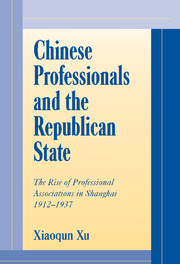 Chinese Professionals and the Republican State
Chinese Professionals and the Republican State Book contents
- Frontmatter
- Contents
- List of Tables
- Acknowledgments
- Abbreviations of Frequently Cited Sources
- Introduction
- Part I Professions and Professionals
- Part II Social Institutions, State Actions, and Professionalization
- Part III Professionalism, Nationalism, and Politics
- 6 From “Literary Men” to Professionals: Shanghai Journalists
- 7 National Essence versus Science: The Medical Profession in Conflict
- 8 Professionalism and Nationalism: The Shanghai Bar Association (I)
- 9 Professionalism and Politics: The Shanghai Bar Association (II)
- Conclusion to Part III
- Conclusion
- Glossary
- Bibliography
- Index
6 - From “Literary Men” to Professionals: Shanghai Journalists
Published online by Cambridge University Press: 07 September 2009
- Frontmatter
- Contents
- List of Tables
- Acknowledgments
- Abbreviations of Frequently Cited Sources
- Introduction
- Part I Professions and Professionals
- Part II Social Institutions, State Actions, and Professionalization
- Part III Professionalism, Nationalism, and Politics
- 6 From “Literary Men” to Professionals: Shanghai Journalists
- 7 National Essence versus Science: The Medical Profession in Conflict
- 8 Professionalism and Nationalism: The Shanghai Bar Association (I)
- 9 Professionalism and Politics: The Shanghai Bar Association (II)
- Conclusion to Part III
- Conclusion
- Glossary
- Bibliography
- Index
Summary
IN EARLY-TWENTIETH-CENTURY China, journalists and writers were both born of the development of the modern press. A large number of journalists and writers clustered in Shanghai, the cosmopolitan treaty port. As Leo Ou-fan Lee described in his study of Chinese writers of the 1920s and 1930s, to a large extent literary writing as a vocation was heralded by literary journalism at the turn of the century and after. Western-style and even traditional education prepared young people for practicing and consuming literary writing. The growth of the press and publishing industry in large cities such as Shanghai provided those people with the opportunity to pursue a new type of career. Lee used the term “literary journalism” because in the early twentieth century the line between literature and journalism was not clearly drawn and was easily crossed. Literary supplements of newspapers were one of the major outlets for the talent and aspirations of would-be writers. Many people wrote for both newspapers and literary publications and worked as both journalists and writers. Journalism and literary writing were almost indistinguishable, as reflected in the fact that both journalist and writer were considered “literary men” (wenren). In the words of a foreign observer in the mid-1920s, “most successful writers in all phases of literature today ‘graduated’ out of the ranks of newspaper editors and reporters.”
- Type
- Chapter
- Information
- Chinese Professionals and the Republican StateThe Rise of Professional Associations in Shanghai, 1912–1937, pp. 161 - 189Publisher: Cambridge University PressPrint publication year: 2000


